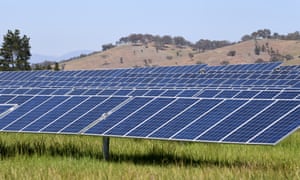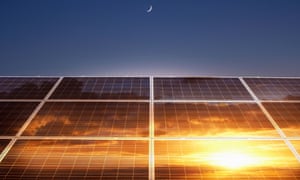Coles signs long-term contract for electricity from three new solar farms
Supermarket giant is the latest in a series of companies that have turned to renewable energy to reduce power bills
Supermarket giant Coles has signed a long-term contract to get electricity from three new solar farms, the latest in a series of companies that have turned to renewable energy to lower power bills.
It comes as a group of 41 retailers and businesses including Bunnings, Harvey Norman, Ikea and JB Hi-Fi plan an unprecedented joint electricity purchase in a bid to reduce costs.
Coles announced a 10-year deal to buy most of the electricity generated at three new solar farms to be built outside Wagga Wagga, Corowa and Junee in NSW.
The plants will be operated by global clean energy company Metka EGN and are expected to provide the equivalent of 10% of Coles’ power needs from June next year.
Steven Cain, Coles Group’s chief executive, said the company was committed to being the most sustainable supermarket in Australia. It had spent more than $40m on energy efficiency over two years and installed solar panels on 30 stores, with another 38 to follow this financial year.
The supermarket agreement follows a similar announcement on Monday by Molycop, a manufacturer for mining and rail companies, that it had signed an 11-year-deal to take electricity from a separate solar farm near Wagga and the Sapphire wind farm in northern NSW to help it limit the impact of rising power prices.
Consultants Energetics say corporate power purchase agreements have supported about 3700 megawatts of clean energy since 2016, more than 80% of which have been new developments. About half of the projects underpinned by big business have been large-scale solar, 40% wind and just under 10% a mix of the two.
Companies to have signed renewable energy contracts include the Commonwealth Bank, Bluescope Steel, Telstra and zinc refiner Sun Metals.
While there is uncertainty over whether the clean energy boom of the past two years will continue, Kane Thornton, chief executive of industry group the Clean Energy Council, said the falling cost of solar and wind energy suggested deals would continue to be signed.
“We’re just going to see more and more businesses got it alone or join consortia to provide their power and the economics says more and more that will be renewables,” he said.
The group of 41 retailers, also including Officeworks, Chemist Warehouse, Costco and Spotlight, have applied to the consumer watchdog for approval to ask for tenders to supply their power needs, which adds up to 0.5% of the total electricity drawn from the national grid.
Lodged on behalf of the businesses by the Large Format Retail Association, the application to the Australian Competition and Consumer Commission does not say the electricity would be renewable, but it cites two previous large-scale clean energy bulk buys, by the South Australian Chamber of Mines and Energy and the City of Melbourne, as evidence of why the application should be approved.
It says the consortium could expand to include other companies, but would not make up more than 1% of electricity use, and could lead to investment in new generation while lowering power bills for member companies.
Tony Wood, energy program director with thinktank the Grattan Institute, said the joint bid illustrated the frustration businesses felt about high electricity prices, which have been linked to the lack of a coherent national energy policy.
Lindsay Soutar, a campaigner with Greenpeace, said the Coles deal was a “great first step” and showed companies were now leading the way on a transition to 100% renewable energy. “People have the choice to support the businesses that are doing their part in enabling a safe and healthy climate,” she said.
As the crisis escalates…
… in our natural world, we refuse to turn away from the climate catastrophe and species extinction. For The Guardian, reporting on the environment is a priority. We give reporting on climate, nature and pollution the prominence it deserves, stories which often go unreported by others in the media. At this pivotal time for our species and our planet, we are determined to inform readers about threats, consequences and solutions based on scientific facts, not political prejudice or business interests.
More people are reading and supporting The Guardian’s independent, investigative journalism than ever before. And unlike many news organisations, we have chosen an approach that allows us to keep our journalism accessible to all, regardless of where they live or what they can afford. But we need your ongoing support to keep working as we do.
The Guardian will engage with the most critical issues of our time – from the escalating climate catastrophe to widespread inequality to the influence of big tech on our lives. At a time when factual information is a necessity, we believe that each of us, around the world, deserves access to accurate reporting with integrity at its heart.
Our editorial independence means we set our own agenda and voice our own opinions. Guardian journalism is free from commercial and political bias and not influenced by billionaire owners or shareholders. This means we can give a voice to those less heard, explore where others turn away, and rigorously challenge those in power.
We need your support to keep delivering quality journalism, to maintain our openness and to protect our precious independence. Every reader contribution, big or small, is so valuable. Support The Guardian from as little as £1 – and it only takes a minute. Thank you.



No comments:
Post a Comment